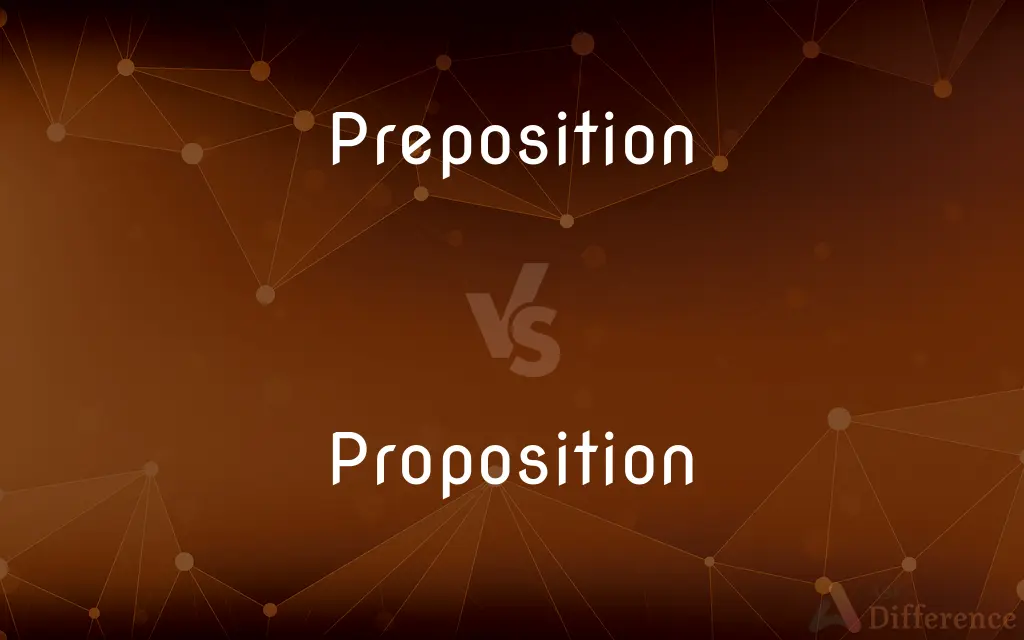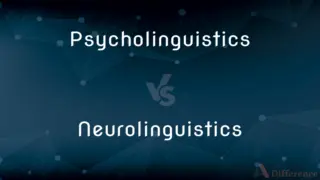Preposition vs. Proposition — What's the Difference?
Edited by Tayyaba Rehman — By Urooj Arif — Updated on May 29, 2024
Preposition connects words in a sentence, indicating relation. Proposition is a statement or idea proposed for consideration.

Difference Between Preposition and Proposition
Table of Contents
ADVERTISEMENT
Key Differences
A preposition is a part of speech that shows the relationship between a noun or pronoun and other elements in a sentence, often indicating direction, location, or time. Common prepositions include "in," "on," "at," "by," and "with." They are integral to providing context and clarity in sentences. Proposition, on the other hand, refers to a statement or an idea that is put forward for consideration or discussion. It is often used in the context of formal arguments, business, mathematics, and philosophy, indicating an assertion that can be debated, proven, or disproven.
While prepositions are primarily used to construct sentences and convey spatial, temporal, or logical relationships between words, propositions serve as the basis for argumentation, expressing concepts or judgments that can be analyzed or evaluated. This distinction highlights the functional difference between the two: one is a building block of grammar, while the other is a unit of thought or proposal.
Prepositions do not stand alone but function within sentences to connect words, thereby providing additional information about how the objects of the prepositions relate to the rest of the sentence. In contrast, propositions can stand alone as complete ideas or statements, capable of being true or false, and are subject to scrutiny and discussion in various disciplines.
The understanding of prepositions is essential for mastering syntax and structuring sentences correctly in any language. They are foundational in language learning and teaching, helping to express complex relationships in simple terms. Propositions, however, are fundamental to reasoning and communication, especially in areas requiring critical thinking and debate, such as law, philosophy, and mathematics.
In terms of application, prepositions are ubiquitous in everyday language, used in both spoken and written communication to articulate the relationships between objects and actions. Propositions are more frequently encountered in academic, professional, and formal contexts, where ideas, hypotheses, and theories are proposed, discussed, and tested.
ADVERTISEMENT
Comparison Chart
Definition
A word that shows the relationship between nouns or pronouns and other elements in a sentence
A statement or idea proposed for consideration or debate
Examples
"In the house," "on the table," "by the time"
"All men are mortal," "The project will be profitable"
Primary Use
Grammar and sentence construction
Argumentation and idea presentation
Function
Connects words and shows relationships
Presents an idea or statement for discussion
Context
Everyday language, both spoken and written
Formal discussions, academic research, business proposals
Nature
Structural element of language
Conceptual or argumentative content
Significance
Essential for syntax and clear communication
Important for reasoning, debate, and knowledge development
Compare with Definitions
Preposition
A grammatical element that indicates the relationship between words in a sentence.
The book is on the table.
Proposition
A statement or idea put forward for consideration or argument.
The proposition that the earth orbits the sun was revolutionary.
Preposition
Connects nouns, pronouns, and phrases to other words.
She arrived after the movie started.
Proposition
Can be true or false, and are subject to scrutiny.
The proposition that all swans are white was disproven by the discovery of black swans.
Preposition
Common prepositions include "in," "at," "by," "with," and "from."
They traveled by car.
Proposition
Used in logic, philosophy, and debate to present ideas.
Her proposition for the new policy sparked much discussion.
Preposition
Provides context, such as location, direction, or time.
He walked to the park.
Proposition
Serves as the basis for argumentation or proposal.
The business proposition was accepted unanimously.
Preposition
Essential for clear and precise communication.
I will meet you at noon.
Proposition
Fundamental to the development and communication of ideas.
The proposition of universal basic income is gaining attention.
Preposition
A word governing, and usually preceding, a noun or pronoun and expressing a relation to another word or element in the clause, as in ‘the man on the platform’, ‘she arrived after dinner’, ‘what did you do it for?’.
Proposition
In logic and linguistics, a proposition is the meaning of a declarative sentence. In philosophy, "meaning" is understood to be a non-linguistic entity which is shared by all sentences with the same meaning.
Preposition
A word or phrase placed typically before a substantive and indicating the relation of that substantive to a verb, an adjective, or another substantive, as English at, by, with, from, and in regard to.
Proposition
A plan suggested for acceptance; a proposal.
Preposition
To position or place in position in advance
Artillery that was prepositioned at strategic points in the desert.
Proposition
A matter to be dealt with; a task
Finding affordable housing can be a difficult proposition.
Preposition
Any of a class of non-inflecting words typically employed to connect a following noun or a pronoun, in an adjectival or adverbial sense, with some other word: a particle used with a noun or pronoun (in English always in the objective case) to make a phrase limiting some other word.
Proposition
A subject for discussion or analysis.
Preposition
An adposition.
Proposition
A statement that affirms or denies something.
Preposition
(obsolete) A proposition; an exposition; a discourse.
Proposition
The meaning expressed in such a statement, as opposed to the way it is expressed.
Preposition
To place in a location before some other event occurs.
It is important to preposition the material before turning on the machine.
Proposition
(Mathematics) A theorem.
Preposition
A word employed to connect a noun or a pronoun, in an adjectival or adverbial sense, with some other word; a particle used with a noun or pronoun (in English always in the objective case) to make a phrase limiting some other word; - so called because usually placed before the word with which it is phrased; as, a bridge of iron; he comes from town; it is good for food; he escaped by running.
Proposition
(uncountable) The act of offering (an idea) for consideration.
Preposition
A proposition; an exposition; a discourse.
He made a long preposition and oration.
Proposition
(countable) An idea or a plan offered.
Preposition
A function word that combines with a noun or pronoun or noun phrase to form a prepositional phrase that can have an adverbial or adjectival relation to some other word
Proposition
The terms of a transaction offered.
Preposition
(linguistics) the placing of one linguistic element before another (as placing a modifier before the word it modifies in a sentence or placing an affix before the base to which it is attached)
Proposition
In some states, a proposed statute or constitutional amendment to be voted on by the electorate.
Proposition
(grammar) A complete sentence.
Proposition
The content of an assertion that may be taken as being true or false and is considered abstractly without reference to the linguistic sentence that constitutes the assertion; (Aristotelian logic) a predicate of a subject that is denied or affirmed and connected by a copula.
“‘Wiktionary is a good dictionary’ is a proposition” is a proposition.
Proposition
An assertion so formulated that it can be considered true or false.
Proposition
An assertion which is provably true, but not important enough to be called a theorem.
Proposition
A statement of religious doctrine; an article of faith; creed.
The propositions of Wyclif and Huss
Proposition
(poetic) The part of a poem in which the author states the subject or matter of it.
Proposition
To make an offer or suggestion to (someone).
Proposition
The act of setting or placing before; the act of offering.
Proposition
That which is proposed; that which is offered, as for consideration, acceptance, or adoption; a proposal; as, the enemy made propositions of peace; his proposition was not accepted.
Proposition
A statement of religious doctrine; an article of faith; creed; as, the propositions of Wyclif and Huss.
Some persons . . . change their propositions according as their temporal necessities or advantages do turn.
Proposition
A complete sentence, or part of a sentence consisting of a subject and predicate united by a copula; a thought expressed or propounded in language; a from of speech in which a predicate is affirmed or denied of a subject; as, snow is white.
Proposition
A statement in terms of a truth to be demonstrated, or of an operation to be performed.
Proposition
That which is offered or affirmed as the subject of the discourse; anything stated or affirmed for discussion or illustration.
Proposition
The part of a poem in which the author states the subject or matter of it.
Proposition
(logic) a statement that affirms or denies something and is either true or false
Proposition
A proposal offered for acceptance or rejection;
It was a suggestion we couldn't refuse
Proposition
The act of making a proposal;
They listened to her proposal
Proposition
A task to be dealt with;
Securing adequate funding is a time-consuming proposition
Common Curiosities
What is a proposition?
A proposition is a statement or idea proposed for consideration, argument, or discussion, often used in formal contexts like logic, philosophy, and business.
Why are propositions significant?
Propositions are significant for presenting ideas, arguments, and theories, playing a crucial role in reasoning, debate, and the development of knowledge.
Why are prepositions important?
Prepositions are important for structuring sentences and providing necessary context about relationships between words, essential for clear communication.
What is a preposition?
A preposition is a word that shows the relationship between a noun or pronoun and other words in a sentence, indicating direction, location, or time.
How do prepositions function in a sentence?
Prepositions function by connecting nouns, pronouns, and phrases to other words, indicating relationships of time, place, direction, and more.
What role do propositions play in argumentation?
Propositions serve as the basis for arguments, presenting ideas or claims that can be supported, refuted, or debated.
Can prepositions and propositions be used interchangeably?
No, prepositions and propositions serve different purposes; prepositions are grammatical elements, while propositions are statements or ideas for consideration.
Can propositions be complex?
Yes, propositions can be complex, especially in philosophical and theoretical discussions, where they may involve multiple clauses and sophisticated concepts.
How do propositions contribute to scientific research?
In scientific research, propositions are used to formulate hypotheses that can be tested through experimentation, contributing to the advancement of scientific knowledge.
Can a single word be both a preposition and a proposition?
No, a single word cannot serve as both a preposition and a proposition because they belong to different categories of speech and serve distinct purposes.
How does one effectively use prepositions in multilingual communication?
In multilingual communication, effectively using prepositions requires understanding their nuances and variations in use across different languages to ensure clarity and prevent misunderstandings.
Are there specific contexts where propositions are more commonly used?
Yes, propositions are more commonly used in formal, academic, and professional contexts, where ideas and theories are proposed and debated.
What are some examples of propositions in mathematics?
In mathematics, propositions are statements that can be proven to be true or false, such as "The sum of two even numbers is even."
How do prepositions enhance literary works?
Prepositions enhance literary works by providing clarity and depth to descriptions, allowing authors to precisely convey relationships between characters, settings, and actions.
Share Your Discovery

Previous Comparison
Psycholinguistics vs. Neurolinguistics
Next Comparison
Panel vs. PannelAuthor Spotlight
Written by
Urooj ArifUrooj is a skilled content writer at Ask Difference, known for her exceptional ability to simplify complex topics into engaging and informative content. With a passion for research and a flair for clear, concise writing, she consistently delivers articles that resonate with our diverse audience.
Edited by
Tayyaba RehmanTayyaba Rehman is a distinguished writer, currently serving as a primary contributor to askdifference.com. As a researcher in semantics and etymology, Tayyaba's passion for the complexity of languages and their distinctions has found a perfect home on the platform. Tayyaba delves into the intricacies of language, distinguishing between commonly confused words and phrases, thereby providing clarity for readers worldwide.
















































